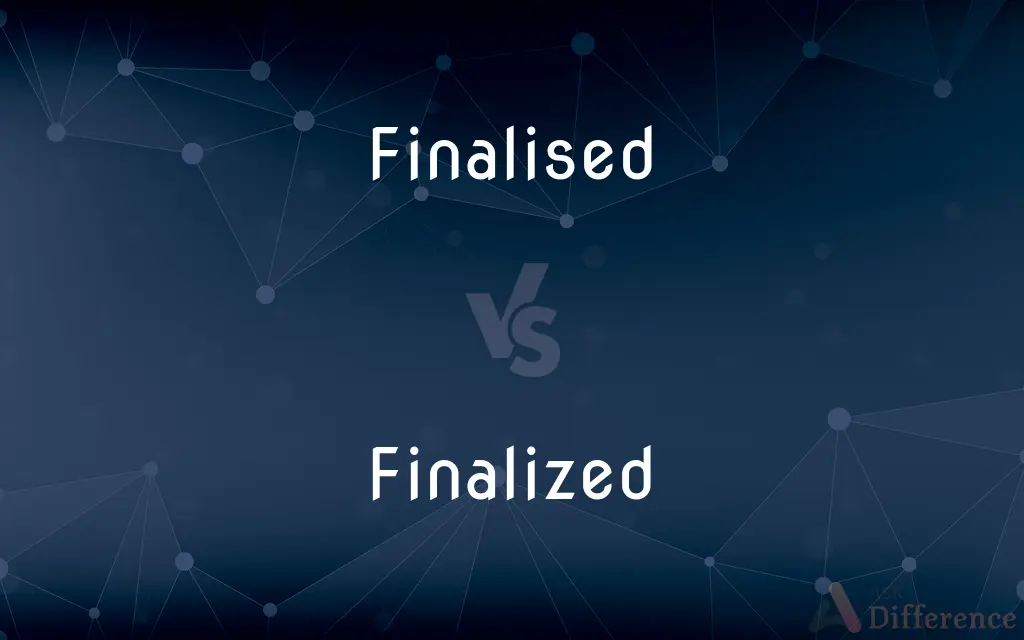Finalised vs. Finalized — What's the Difference?
By Fiza Rafique & Maham Liaqat — Updated on March 9, 2024
"Finalised" and "finalized" are variations of the same word, with "finalised" being the preferred spelling in British English, and "finalized" favored in American English, both meaning to complete or make final.

Difference Between Finalised and Finalized
Table of Contents
ADVERTISEMENT
Key Differences
The distinction between "finalised" and "finalized" lies primarily in the geographical variation of English spelling. "Finalised" is commonly used in British English, reflecting the British preference for "-ise" endings in words like "organise" and "realise." This usage aligns with other British English spelling conventions that often differ from American English. On the other hand, "finalized" is the standard spelling in American English, which favors "-ize" endings for verbs. This difference is part of a broader pattern of spelling variations that include "color" vs. "colour" and "theater" vs. "theatre," among others.
Both terms convey the same meaning: to complete something, make it final, or formally conclude an agreement or process. The context in which they are used is usually professional or formal, such as finalizing (or finalising) a deal, a project, or plans. Despite the spelling differences, the pronunciation of these words is essentially the same in both varieties of English, focusing on the finality of the action rather than the spelling used to describe it.
The choice between "finalised" and "finalized" should be based on the intended audience or the standard conventions of the English variety being used. For instance, an American company might use "finalized" in its communications, while a British firm would opt for "finalised." This adherence to regional spelling norms aids in maintaining consistency in written communication and can contribute to a more polished and locally appropriate presentation.
The distinction between these spellings highlights the importance of understanding and respecting linguistic variations across English-speaking countries. It serves as a reminder of the rich diversity within the English language and the need for flexibility and awareness when communicating across different cultural and linguistic contexts.
While "finalised" and "finalized" have identical meanings and functions, the choice of spelling should align with the preferred conventions of British or American English, respectively. Recognizing and applying these spelling variations correctly can enhance clarity and appropriateness in written communication.
ADVERTISEMENT
Comparison Chart
Spelling Variation
Preferred in British English.
Preferred in American English.
Meaning
To complete or conclude something.
To complete or conclude something.
Pronunciation
Same in both British and American English.
Same in both British and American English.
Usage Context
Formal or professional settings.
Formal or professional settings.
Example of Similar Variations
"Organise" in British English.
"Organize" in American English.
Compare with Definitions
Finalised
Project conclusion.
The project was successfully finalised ahead of schedule.
Finalized
Agreement completion.
The deal was finalized late last night.
Finalised
Decision-making.
The committee finalised the list of attendees.
Finalized
Project conclusion.
The construction plans were finalized this morning.
Finalised
Document preparation.
The report was finalised and ready for presentation.
Finalized
Event planning.
The conference schedule was finalized after much deliberation.
Finalised
Agreement completion.
The contract was finalised after weeks of negotiation.
Finalized
Decision-making.
They finalized the guest speaker for the conference.
Finalised
Event planning.
The details of the event were finalised yesterday.
Finalized
Document preparation.
The budget proposal was finalized and submitted.
Finalised
Simple past tense and past participle of finalise
Finalized
To put into final form; complete.
Finalized
Simple past tense and past participle of finalize
Common Curiosities
Is one spelling more correct than the other?
Neither spelling is more correct; the choice depends on the regional convention of the audience.
Can the use of one spelling over the other affect the understanding of a text?
No, the understanding of a text is not affected by the choice between "finalised" and "finalized" as they convey the same meaning.
Does the difference in spelling reflect a difference in pronunciation?
No, the pronunciation of "finalised" and "finalized" is the same despite the spelling difference.
Is it important to be consistent with spelling choices in a single document?
Yes, consistency in spelling within a document is important for maintaining professionalism and readability.
Which spelling should I use in academic writing?
Use the spelling that aligns with the preferred conventions of the English variety specified by your academic institution or publisher.
Can software help me choose the correct spelling?
Yes, word processing software with language settings can suggest the correct spelling based on British or American English preferences.
Are "finalised" and "finalized" interchangeable?
Yes, they are interchangeable, depending on the regional spelling preference.
How can I remember which spelling to use?
Remember that American English often uses "-ize" while British English uses "-ise," though there are exceptions to this rule.
Do other English-speaking countries have a preference?
Countries like Canada, Australia, and New Zealand may lean towards British English spelling, but variations exist.
Are there other words with similar British and American English spelling differences?
Yes, many words have similar variations, such as "realise/realize" and "civilise/civilize."
Share Your Discovery

Previous Comparison
Daystar vs. Lucifer
Next Comparison
Guess vs. AssumeAuthor Spotlight
Written by
Fiza RafiqueFiza Rafique is a skilled content writer at AskDifference.com, where she meticulously refines and enhances written pieces. Drawing from her vast editorial expertise, Fiza ensures clarity, accuracy, and precision in every article. Passionate about language, she continually seeks to elevate the quality of content for readers worldwide.
Co-written by
Maham Liaqat















































